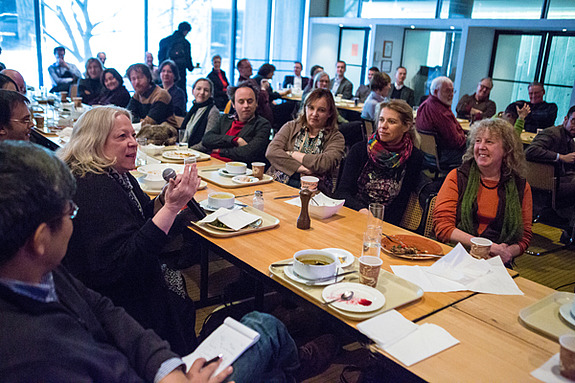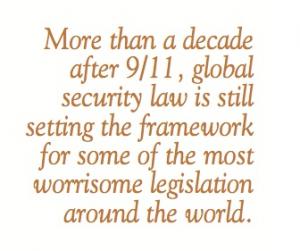From a War on Terrorism to Global Security Law

On December 11, 2003, when asked in a press conference whether his Iraq policy was consistent with international law, President George W. Bush joked, “International law? I better call my lawyer; he didn’t bring that up to me.”
But, in fact, since the 9/11 attacks, the United States government had aggressively constructed a new body of international law: global security law. While the Bush administration is probably best known for its CIA black sites, extraordinary rendition, and defense of torture, those policies were in fact rather short-lived, lasting a handful of years at most. By contrast, global security law not only still exists but is becoming ever more entrenched. More than a decade after the attacks, global security law remains one of the most persistent legacies of 9/11.
On September 28, 2001, the United Nations Security Council passed Resolution 1373. Operating under Chapter VII of the UN Charter, which makes resolutions binding on all member states (noncompliance is at least theoretically subject to sanctions), the Security Council required states to change their domestic law in parallel ways to fight terrorism. Previously, the Security Council had typically directed states’ actions or urged states to sign treaties, but it had not directed changes in countries’ domestic laws. With Resolution 1373, the Security Council required states to alter some of the most sensitive areas of national law, like criminal law and domestic intelligence law.
Under Resolution 1373, all 192 members states of the United Nations were required to make terrorism a serious crime in domestic law, along with conspiracy to commit terrorism, aiding and abetting terrorism, providing material support for terrorism, inciting terrorism, and other ancillary offenses. Yet the Security Council failed to provide a definition of terrorism that would have confined these new crimes to either the perpetrators or the actions implicated in the 9/11 attacks. Not surprisingly, states proceeded to enact a proliferation of very different terrorism offenses, ranging from narrowly defined crimes to political crimes so broadly framed that they included all government opponents in their purview.
Without substantial constitutional traditions, some countries defined terrorism to be virtually any politically motivated challenge to the state, which almost entirely overlapped with the field of political dissent. For example, Vietnam defined a terrorist as anyone who “oppose(s) the people’s administration and infringe(s) upon the lives of officials, public employees, or citizens.” In Brunei, a terrorist is “any person who . . . by the use of any firearm, explosive, or ammunition acts in a manner prejudicial to public safety or to the maintenance of public order or incites to violence or counsels disobedience to the law or to any lawful order.”
Still other states criminalized terrorists while exempting freedom fighters, tying the law to the foreign policy of the state. This was true of a number of Arab states that sought to distinguish acts designed to resist Israeli occupation from other violent attacks against state interests. Still other countries dusted off old anti-subversion or anti-communist laws, crossing out “subversion” or “communism” and replacing them with “terrorism.”

In addition to criminalizing terrorism, Resolution 1373 required states to gather information about any terrorists or terrorist groups that might be operating in their own territory and to cooperate with the investigations of other states by sharing information. States differed widely in their administration of domestic surveillance and investigation, and each state self-determined the information that was added to global intelligence.
Inconsistent information, from coverage to quality, circulated through international channels, and states acted on the basis of this new data, even if the sources were dodgy. Moreover, states that might have had reasonable legal checks on their own surveillance and tracking of terrorists at home turned their information over to states that were not so scrupulous. For at least five years after Resolution 1373, the Security Council never insisted that countries respect human rights as they shared information or acted on the basis of others’ tips. As a result, many states took Security Council resolutions as legal permission (or cover) to do many things in the name of fighting terrorism that they might not have done on their own.
For example, Yemen established a special police force for the purposes of fighting terrorism and later reported that it was establishing a special National Security Agency for controlling terrorism investigations as well. Spain has created a National Counter-Terrorism Coordinating Center for terrorism investigations, which brings together the national police with the Civil Guard (Spain’s equivalent of the National Guard) and the military intelligence agency, all with the purpose of sharing information across their databases. New Zealand passed the Interception Capability Act in 2004, which requires that telecommunications hubs for phone and internet systems maintain a capacity to intercept communications and to comply with warrants for surveillance. Canada passed a new anti-terrorism bill in fall 2001, creating investigative hearings enabling judges to collect intelligence from terrorism suspects.
Resolution 1373 also required states to block terrorism financing by freezing assets of individuals and groups on Security Council watch lists to ensure that no funds reached terrorists through domestic channels (which often meant not only using the Security Council’s watch list but also honoring other states’ watch lists as well) and criminalizing any financing of terrorist activity under domestic law. States were pressed to initiate “automatic” and comprehensive asset freezes against people who turned up on these watch lists, without confirmation that the listing was based on adequate information. The Security Council did not stipulate any concern for individual privacy or due process rights in association with these programs. Those whose assets were frozen had no procedure, domestically or internationally, to challenge the freezes. Individual governments were denied access to the information used by international bodies to list suspects, so they could not hold reasonable hearings to assess whether the freezes were appropriate. Moreover, international bodies (like the Security Council itself) had no judicial mechanisms to determine whether individuals had been wrongly listed. The number of suspects on these lists is quite large. The United States, for example, has frozen the assets of more than ten thousand individuals and groups. Few have had any sort of due process.
States were also required by Resolution 1373 to block terrorists’ use of their territory by suppressing recruitment of terrorists, eliminating their access to weapons, and denying safe haven to any of their members. With no internationally agreed-upon definition of terrorism, the set of groups hit by these measures sometimes expanded to include states’ general enemies lists. And because these measures required states to restrict international travel by terrorists, states responded by stepping up border controls, increasing the security of travel documents, and examining claims for refugee and asylum status more closely. Applied to members of al-Qaeda, this interdiction of movement makes sense. But global politics has meant crackdowns on members of many other groups with rights and legitimate reasons to move. Muslim Uighurs, Chechen nationalists, and Palestinian activists (among others) have been added to the lists of many countries that used to think of these groups as freedom fighters.
The passing of Resolution 1373 represented the first time in the history of international law that a nonrepresentative body within an international organization claimed the power to make binding law for all member states. The resulting program launched by Resolution 1373 has encouraged the worldwide creation of new, vague, and politically defined crimes; sanctioned evasion of prior legal limits before state authorities could search places and people; launched massive new domestic surveillance programs to capture electronic communications; encouraged states to spy on people within and across their borders; moved toward preventive detention and aggressive interrogation regimes; and installed new barriers in international migration.
In a major study (for which I was a consultant) to mark the tenth anniversary of 9/11, the Associated Press used its worldwide network of correspondents to find out how many terrorism convictions had resulted from these new criminal laws. The AP found that 119,000 people had been arrested for terrorism offenses since 9/11 and that slightly more than 35,000 people had been convicted on terrorism charges in 66 countries. But more than half of all convictions came from just two countries: Turkey and China. In Turkey, the targets of terrorism investigations were separatist Kurds. In China, the targets were Uighurs, a Muslim minority that has been engaged in an uprising against the Chinese state. Few believe that either the Kurds or the Uighurs are connected with global terrorism of the sort that the Security Council’s actions were aimed at stopping. Instead, both are groups with local grievances.
During the past decade, the “one-size-fits-all” mandate of the Security Council has been carried out with wild inconsistency. In many cases, however, this new law has benefited those in power and enabled them to foil their domestic political opponents in conflicts that have had virtually nothing to do with 9/11. The new landscape of international public legality now puts extraordinary international legal pressure on constitutionalism and on domestic constitutional values. Repressive states have used repressive law for repressive purposes, highlighting the danger of issuing a common set of commands to an extremely diverse group of states. More than a decade after 9/11, global security law is still setting the framework for some of the most worrisome legislation around the world.